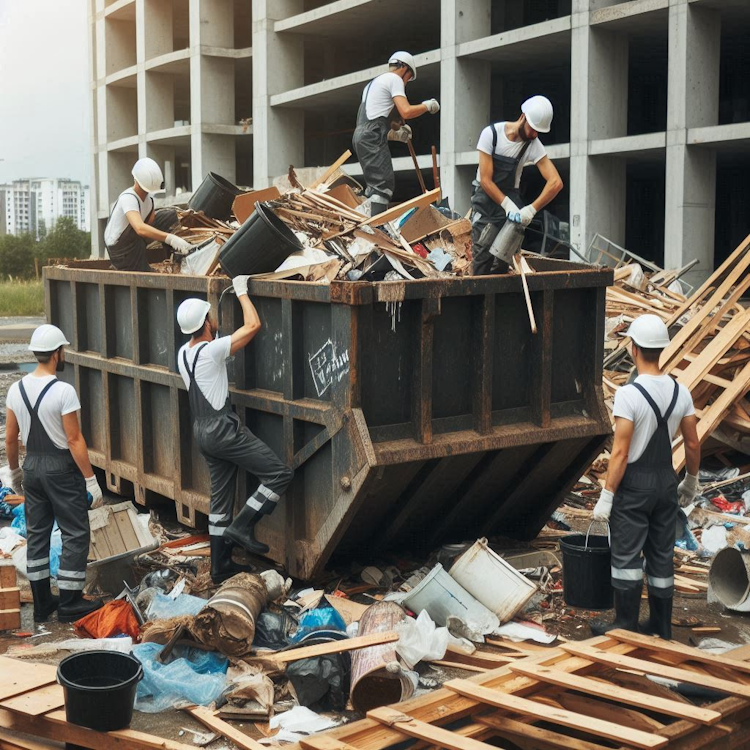The construction industry plays an important role in the economy of South Carolina, accounting for a large portion of infrastructure buildout, the creation of residential areas, and commercial development.
Construction and demolition activities also produce large quantities of waste, including wood, metal, concrete, drywall, plastics, and other materials, requiring junk disposal services. The effective and conscientious disposal of this debris is crucial for safety, environmental stewardship, and legal compliance.
Construction Debris Removal
Safety Concerns
Construction sites are places where debris tends to accumulate, which can pose a risk to workers.
Nails, sharp metal edges, pieces of broken glass and unsecured piles of scrap can create hazards for employees, contractors and visitors. Cleaning up junk and trash immediately prevents accidents from happening and reduces the liability of construction companies, while also keeping them compliant with Occupational Safety and Health Administration (OSHA) regulations.
Environmental Considerations
The removal of debris is a crucial component for reducing environmental impacts.
Construction waste can contaminate soil and water by leaching hazardous substances, if not handled properly. Also, refuse materials such as plastics and treated wood, for example, can leach dangerous chemicals into the environment when exposed. Sustainable construction involves doing proper disposal, recycling, and repurposing materials to reduce the carbon footprint of any construction and contribute to sustainability.
Regulatory Compliance
In South Carolina construction waste management is regulated by strict rules.
Under Resource Conservation and Recovery Act (RCRA), the EPA rules which are enforced by EPA regarding safe handling and disposal of hazardous and. On a local and state level, there are also laws and regulations that dictate how waste must be disposed of, and contractors must follow all the rules regarding sorting, recycling, and landfills. Non-compliance can incur significant fines and jeopardize the project.
Methods of Debris Removal
On-Site Sorting and Recycling
Numerous construction companies have implemented on-site sorting to distinguish between recyclable materials such as metals, concrete and wood and non-recyclable waste. These materials can be recycled into reusable products, such as crushed concrete for roadbeds or recycled metal that can be made into new construction.
Use of Specialized Equipment
Typically, bulldozers, loaders, and excavators are used to load large volumes of debris on-site. Portable dumpsters and debris chutes can also be a perfect solution to get a smaller project done or save space. These tools guarantee a quick and safe cleanup.
Working with Waste Management Services
Most contractors work with specialized waste management and dumpster rental firms that provide collection, transport and disposal.
These local providers frequently manage hazardous materials and ensure that waste processing is carried out in compliance with local and federal laws. More sophisticated services include debris compaction, recycling logistics, and reuse and landfill diversion planning.
Difficulties in Clearing Construction Debris
The volume and mass of components
Building projects, especially massive ones, create tons of heavy debris. Such as, demolition works generates thousands of tons of concrete, bricks, asphalt etc. It takes a lot of logistical planning and resources to transport and dispose of dealing with that amount of material.
Cost Management
Debris removal can be costly, involving the cost of labor, equipment and land fill. Though recycling is good for the planet, it could lead to higher up-front prices if sorting and processing are more strictly enforced. Juggling cost efficiency with making sustainable decisions is still difficult for a lot of contractors.
Limited Landfill Space
Landfill space in South Carolina is running out, putting more pressure on construction companies to recycle and divert waste. Construction and demolition (C&D) debris is estimated by the EPA to be about twice the amount of municipal solid waste. It calls for new approaches to help address and ease the need to rely on landfills.
Perks of Well-Organized Garbage Disposal
Building Trust and Reputation in the Workplace
When you handle debris efficiently, it shows that you value safety, environmental responsibility, and professionalism.
In the face of this increasing interest, strong waste management is the competitive advantage in these times, as Clients and stakeholders are relating sustainability more than ever now.
Advocating for Circular Economy Initiatives
Through reusing and recycling materials, the construction industry contributes to a circular economy, which reduces the need for raw materials and hence lowers the greenhouse gas emissions associated with their production and transportation.
Speeding Up Completion of Projects
Construction sites that are clean and orderly are likely to run more efficiently and avoid down time from clutter or a safety hazard. Debris removal at the right time keeps the projects ahead of schedule.
In South Carolina in many locations including Myrtle Beach, debris removal is a pivotal aspect of construction site management.
It requires balancing safety, environmental and regulatory demands with logistical and financial challenges. As technology strives onward and environmentalism gathers more and more advocates, the field is beginning to embrace more creative and conscientious debris treatment methods. By applying these methods, construction companies can reduce their environmental footprint while improving operational efficiency and creating safer, cleaner, and more sustainable projects.



